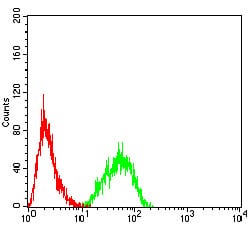


| WB | 咨询技术 | Human,Mouse,Rat |
| IF | 咨询技术 | Human,Mouse,Rat |
| IHC | 咨询技术 | Human,Mouse,Rat |
| ICC | 技术咨询 | Human,Mouse,Rat |
| FCM | 1/200 - 1/400 | Human,Mouse,Rat |
| Elisa | 1/10000 | Human,Mouse,Rat |
| Aliases | PDCD1; PD-1; CD279; SLEB2; hPD-1; hPD-l; hSLE1 |
| Entrez GeneID | 5133 |
| clone | 8G5B12 |
| WB Predicted band size | 31.6kDa |
| Host/Isotype | Mouse IgG1 |
| Antibody Type | Primary antibody |
| Storage | Store at 4°C short term. Aliquot and store at -20°C long term. Avoid freeze/thaw cycles. |
| Species Reactivity | Human |
| Immunogen | Purified recombinant fragment of human PD1 (AA: 192-288) expressed in E. Coli. |
| Formulation | Purified antibody in PBS with 0.05% sodium azide |
+ +
以下是关于PD-1抗体的3篇关键参考文献,涵盖临床应用及机制研究:
1. **文献名称**: *Safety, Activity, and Immune Correlates of Anti-PD-1 Antibody in Cancer*
**作者**: Topalian, S. L. 等
**摘要**: 该研究(2012年发表于《新英格兰医学杂志》)首次报告了抗PD-1抗体nivolumab在晚期黑色素瘤、非小细胞肺癌等实体瘤中的临床试验结果,显示患者肿瘤持续消退且副作用可控。同时发现肿瘤PD-L1表达可能与疗效相关。
2. **文献名称**: *Pembrolizumab versus Ipilimumab in Advanced Melanoma*
**作者**: Robert, C. 等
**摘要**: 这项KEYNOTE-006试验(2015年发表于《新英格兰医学杂志》)比较了帕博利珠单抗(抗PD-1抗体)与伊匹木单抗(抗CTLA-4抗体)在晚期黑色素瘤中的疗效。结果显示帕博利珠单抗显著延长患者无进展生存期和总生存期,且安全性更优。
3. **文献名称**: *Nivolumab plus Ipilimumab in Advanced Non–Small-Cell Lung Cancer*
**作者**: Hellmann, M. D. 等
**摘要**: CheckMate 227试验(2018年发表于《新英格兰医学杂志》)表明,纳武利尤单抗联合伊匹木单抗在PD-L1阳性晚期非小细胞肺癌患者中较化疗显著延长无进展生存期,尤其对高肿瘤突变负荷患者效果更佳。
4. **文献名称**: *PD-1 and its ligands in tolerance and immunity*
**作者**: Okazaki, T. 和 Honjo, T.
**摘要**: 这篇综述(2007年发表于《免疫学年评》)系统总结了PD-1信号通路在免疫耐受和肿瘤逃逸中的作用,为PD-1抗体的临床应用奠定了理论基础。
这些文献涵盖了PD-1抗体的机制探索、关键临床试验及联合治疗进展,反映了其在癌症免疫治疗中的里程碑成果。
**Background of PD-1 Antibodies**
Programmed cell death protein 1 (PD-1), an immune checkpoint receptor expressed on T cells, plays a critical role in regulating immune tolerance and preventing autoimmunity. Discovered in the 1990s, PD-1 interacts with its ligands PD-L1 and PD-L2. often overexpressed by tumor cells or in chronic infections, to suppress T-cell activation and promote immune evasion. This mechanism allows cancers to escape immune surveillance.
PD-1 antibodies, a class of immune checkpoint inhibitors, block PD-1/PD-L1 interactions, restoring T-cell-mediated antitumor responses. The first PD-1 antibody, nivolumab, was approved in 2014. marking a breakthrough in cancer immunotherapy. Since then, agents like pembrolizumab and cemiplimab have been developed, showing remarkable efficacy in diverse cancers, including melanoma, non-small cell lung cancer, and Hodgkin’s lymphoma.
Clinical successes have driven research into combination therapies (e.g., with CTLA-4 inhibitors or chemotherapy) to enhance response rates. However, challenges persist, such as variable patient responses, immune-related adverse events, and resistance mechanisms. Ongoing studies focus on predictive biomarkers (e.g., PD-L1 expression, tumor mutational burden) to personalize treatment.
PD-1 antibodies exemplify the shift toward harnessing the immune system against cancer, earning their developers the 2018 Nobel Prize in Physiology or Medicine. Their impact continues to expand, reshaping oncology and inspiring novel immunotherapeutic strategies.
×